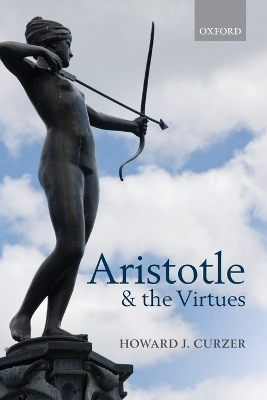
Aristotle and the Virtues
Seiten
2015
Oxford University Press (Verlag)
978-0-19-870964-0 (ISBN)
Oxford University Press (Verlag)
978-0-19-870964-0 (ISBN)
Howard Curzer presents a new reading of Aristotle's Nicomachean Ethics, which brings each of the virtues alive. He argues that justice and friendship are symbiotic in Aristotle's view; reveals how virtue ethics is not only about being good, but about becoming good; and describes Aristotle's ultimate quest to determine happiness.
Aristotle is the father of virtue ethics--a discipline which is receiving renewed scholarly attention. Yet Aristotle's accounts of the individual virtues remain opaque, for most contemporary commentators of Aristotle's Nicomachean Ethics have focused upon other matters. In contrast, Howard J. Curzer takes Aristotle's detailed description of the individual virtues to be central to his ethical theory. Working through the Nicomachean Ethics virtue-by-virtue, explaining and generally defending Aristotle's claims, this book brings each of Aristotle's virtues alive. A new Aristotle emerges, an Aristotle fascinated by the details of the individual virtues.
Justice and friendship hold special places in Aristotle's virtue theory. Many contemporary discussions place justice and friendship at opposite, perhaps even conflicting, poles of a spectrum. Justice seems to be very much a public, impartial, and dispassionate thing, while friendship is paradigmatically private, partial, and passionate. Yet Curzer argues that in Aristotle's view they are actually symbiotic. Justice is defined in terms of friendship, and good friendship is defined in terms of justice.
Curzer goes on to reveal how virtue ethics is not only about being good; it is also about becoming good. Aristotle and the Virtues reconstructs Aristotle's account of moral development. Certain character types serve as stages of moral development. Certain catalysts and mechanisms lead from one stage to the next. Explaining why some people cannot make moral progress specifies the preconditions of moral development. Finally, Curzer describes Aristotle's quest to determine the ultimate goal of moral development, happiness.
Aristotle is the father of virtue ethics--a discipline which is receiving renewed scholarly attention. Yet Aristotle's accounts of the individual virtues remain opaque, for most contemporary commentators of Aristotle's Nicomachean Ethics have focused upon other matters. In contrast, Howard J. Curzer takes Aristotle's detailed description of the individual virtues to be central to his ethical theory. Working through the Nicomachean Ethics virtue-by-virtue, explaining and generally defending Aristotle's claims, this book brings each of Aristotle's virtues alive. A new Aristotle emerges, an Aristotle fascinated by the details of the individual virtues.
Justice and friendship hold special places in Aristotle's virtue theory. Many contemporary discussions place justice and friendship at opposite, perhaps even conflicting, poles of a spectrum. Justice seems to be very much a public, impartial, and dispassionate thing, while friendship is paradigmatically private, partial, and passionate. Yet Curzer argues that in Aristotle's view they are actually symbiotic. Justice is defined in terms of friendship, and good friendship is defined in terms of justice.
Curzer goes on to reveal how virtue ethics is not only about being good; it is also about becoming good. Aristotle and the Virtues reconstructs Aristotle's account of moral development. Certain character types serve as stages of moral development. Certain catalysts and mechanisms lead from one stage to the next. Explaining why some people cannot make moral progress specifies the preconditions of moral development. Finally, Curzer describes Aristotle's quest to determine the ultimate goal of moral development, happiness.
Howard J. Curzer received both BA and MA degrees in mathematics from Wesleyan University and a PhD in philosophy from the University of Texas at Austin. He has taught at Texas Tech University since 1985. In addition to Aristotle's ethical theory, he has published or presented papers on virtue ethics, measurement of moral development, the ethics of wildlife research, the ethics of care, biomedical ethics, and ethics within the Confucian tradition.
MORAL VIRTUES; JUSTICE AND FRIENDSHIP; MORAL DEVELOPMENT
| Erscheint lt. Verlag | 12.3.2015 |
|---|---|
| Verlagsort | Oxford |
| Sprache | englisch |
| Maße | 161 x 234 mm |
| Gewicht | 692 g |
| Themenwelt | Geisteswissenschaften ► Philosophie ► Ethik |
| Geisteswissenschaften ► Philosophie ► Philosophie Altertum / Antike | |
| ISBN-10 | 0-19-870964-1 / 0198709641 |
| ISBN-13 | 978-0-19-870964-0 / 9780198709640 |
| Zustand | Neuware |
| Haben Sie eine Frage zum Produkt? |
Mehr entdecken
aus dem Bereich
aus dem Bereich
unsere kollektive Verantwortung
Buch | Hardcover (2023)
wbg Theiss in Wissenschaftliche Buchgesellschaft (WBG) (Verlag)
35,00 €


